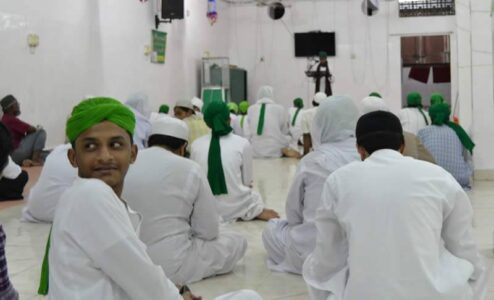
Europe and US fears over Tablighi Jamaat terrorist group
The Tablighi Jamaat Islamic group — which is banned in Central Asia’s Uzbekistan, Tajikistan and Kazakhstan but allowed in Kyrgyzstan — has caused increasing concerns in Europe and the US due to its alleged terrorist influence. We are republishing the following article on the issue, originally published by EU Today:
What is Tablighi Jamaat? It is generally described as “an Islamic missionary movement that focuses on exhorting Muslims and encouraging fellow members to return to practising their religion as it was practised during the lifetime of the Islamic prophet Muhammad, and particularly in matters of ritual, dress and personal behaviour”. Often, it has been referred to as “Islam for the poor”.
The group traces its roots back to 1925 when it was established in India by one Muhammad Ilyas al-Kandhlawi. Today its main strongholds are Bangladesh and Pakistan.
The group is banned in a number of post-Soviet states, notably Russia, and Central Asian countries such as Uzbekistan, Tajikistan and Kazakhstan, where its puritanical preachings are viewed as extremist. As of 2007, it was estimated that 10,000 Tablighi Jamaat members could be found in Kyrgyzstan, a presence largely driven by Pakistani migrants.
The Group’s activities in Kyrgyzstan are of particular interest. There is an opinion that Tablighi Jamaat is used by the authorities to distract society from acute socio-economic problems.
In the country Tablighi Jamaat plays a special role during the electoral period because the leadership of the Spiritual Board of Muslims of Kyrgyzstan largely adheres to the ideas of Tablighi Jamaat.
According to many former Kyrgyz tabligs, their amirs (leaders/head) of Tablighi Jamaat annually send millions of dollars to their patrons in Pakistan.
In Europe, Tablighi Jamaat is particularly active in the UK, where it is reported to have a presence in some 600 mosques, and where, in 2007, the group tried to expand the Abbey Mills Mosque in London into the largest mosque in the United Kingdom.
The plan attracted controversy, with local campaigners arguing that the development would “cause terrible violence and suffering”. Planning permission was eventually denied in 2012. In 2018, following a split within the group, violent clashes were reported on the site. A temporary mosque on the site has since been demolished.
In the UK many outside observers have described the group as “apolitical” at least in part because it avoids media and government attention, and operates largely in secrecy.
In France, by 2006 the group had attracted around 100,000 followers.
In Europe Tablighi Jamaat focused on marginalised populations – “migrant workers deprived of any cultural access to European society”, “lost” teens, and “drug addicts”.
The main concerns surrounding the group, however, relate to its alleged terrorist influence.
Since the horrific events of 9/11, the U.S. Government has closely monitored Tablighi Jamaat. According to U.S. officials, though the Tablighis do not have a direct link with terrorism, the teachings and beliefs of Tablighi Jamaat have been a cornerstone for recruitment for radical Muslim groups.
Some of the terrorists involved in the 9/11 terrorist attack had reportedly stayed in the premises of the Tablighi Jamaat centre in New Delhi. Terrorist Syed Rizwan Farook, involved in the 2015 San Bernardino, California attack which left 16 innocent people dead and 22 injured, was a student of the teachings of Tablighi Jamaat.
As well as the aforementioned attacks on U.S. territory, Tablighi Jamaat adherent Djamel Beghal, an Algerian-born French citizen and Al Qaeda member was convicted of a 2001 plot to blow up the U.S. Embassy in Paris.
In a foiled January 2008 bombing plot in Barcelona, Spain, unconfirmed media reports stated that a Muslim leader in the city claimed that the fourteen suspects arrested by police in a series of raids were members of Tablighi Jamaat.
Other terrorist plots and attacks on civilians that members of have been connected with include the Portland Seven, the Lackawanna Six, the 2006 transatlantic aircraft plot, the 7/7 London bombings, the 2007 London car bombing attempts, and 2007 Glasgow International Airport attack.
According to Pakistani security analysts and Indian investigators, the founders of terrorist group Harkat-ul-Mujahideen (HuM), believed to have had links with Osama bin Laden and al-Qaeda, were members of the Tablighi Jamaat. Their intelligence estimates that over 6,000 Tablighis were trained in HuM terrorist camps in Pakistan.
Bahrain, Canada, India, the UK and the United States have all designated HuM as a terrorist organisation.
The Tablighi Jamaat was also suspected of involvement in the Godhra train burning in 2002, which killed 59 Hindu pilgrims.
In Islamic circles the group is widely criticised for its regressive practices, and in particular its treatment of women, who they are accused of keeping “strictly subservient and second string”.
“The supporters of Tablighi Jamaat preach a version of Islam that is almost indistinguishable from the ideology of jihadists of the Wahhabi or Salafi persuasion, practiced by all terrorists,” the Supreme Court of Russia said in May 2009.
Source: The Times of Central Asia





